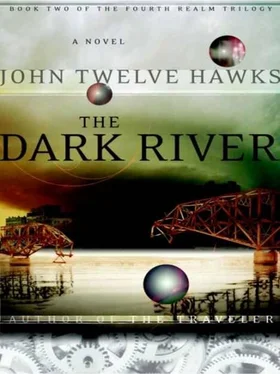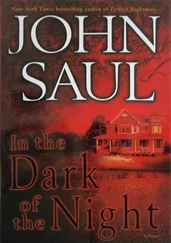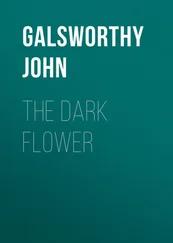“Remember that all of you can still make a choice. You don’t need to accept this new system of control and fear. We have the power to say no. We have the right to be free. Thank you.”
No one applauded or cheered, but they seemed to support the Traveler as he left the room. People touched Gabriel’s hand as he walked past them.
It was cold out on the street. Mother Blessing motioned to Brian, the Irish mercenary who was waiting on the sidewalk. “He’s done. Let’s go.”
They got into the back of a delivery van while Brian slid into the driver’s seat. A few seconds later the van was moving slowly, passing through the fog on Langley Lane.
Mother Blessing turned her head and stared at Gabriel. For the first time since he had met the Harlequin, she didn’t treat him with complete contempt. “Are you going to make any more speeches?” she asked.
I’m still going to search for my father , Gabriel thought, but he kept that plan to himself. “Maybe. I don’t know.”
“You remind me of your father,” Mother Blessing said. “Before we went to Ireland, I heard him speak a few times to groups in Portugal and Spain.”
“Did he ever mention his family?”
“He told me that you and your brother met Thorn when you were little boys.”
“And that’s it? You guarded my father for several months and he never said anything else?”
Mother Blessing gazed out the window as they took a bridge across the river. “He said that both Harlequins and Travelers were on a long road, and sometimes it was difficult to see the light in the distance.”
Camden Market was where Maya, Vicki, and Alice had stepped off the canal boat and entered London. In the Victorian era it had been used as a loading point for the coal and lumber carried on the boats. The warehouses and shipping yards had been converted into a sprawling market filled with little clothing shops and food stalls. It was a place to buy pottery and pastry, antique jewelry and army surplus uniforms.
Brian dropped them off on Chalk Farm Road, and Mother Blessing led Gabriel into the market. The immigrants who ran the food stalls were stacking up chairs and dumping chicken curry into bin bags. A few colored lights left over from Christmas swayed back and forth, but the edges of the market were dark, and rats scurried through the shadows.
Mother Blessing knew the location of every surveillance camera in the area, but occasionally she stopped and used a camera detector-a handheld device about the size of a mobile phone. Powerful diodes in the device emitted infrared light that was invisible to the human eye. The lens of a surveillance camera reflected this narrow-spectrum light so that it glowed like a miniature full moon in the device’s viewing port. Gabriel was impressed by how quickly the Irish Harlequin was able to detect a hidden camera and then move out of its range.
The east end of the market was filled with old brick buildings that had once been used as stables for the horses that dragged carts and omnibuses through the streets of London. More old stables were in tunnels called the catacombs that ran beneath the elevated railroad tracks. Mother Blessing led Gabriel through a brick archway into the catacombs and they hurried past locked shops and artists’ studios. For twenty feet, the tunnel walls were painted pink. In another area the walls were covered with aluminum foil. Finally, they reached the entrance to Winston Abosa’s shop. The West African was sitting on the concrete floor stitching an animal skin to the top of a wooden drum.
Winston got to his feet and nodded to his guests. “Welcome back. I hope the speech was successful.”
“Any customers?” Mother Blessing asked.
“No, madam. It was a very quiet evening.”
They stepped around the African drums and ebony statues of tribal gods and pregnant women. Winston pushed back a cloth banner advertising a drum festival in Stonehenge, revealing a reinforced steel door set into the brick wall. He unlocked the door, and they entered an apartment of four rooms attached to a single hallway. The front room had a folding cot and two television monitors that showed images of the shop and the entrance to the catacombs. Gabriel continued down the hallway past a small kitchen and a bathroom to a windowless bedroom with a chair, desk, and cast-iron bed. This had been his home for the last three days.
Mother Blessing opened up the kitchen cabinet and took out a bottle of Irish whiskey. Winston followed Gabriel into the bedroom. “Are you hungry, Mr. Gabriel?”
“Not right now, Winston. I’ll make some tea and toast later tonight.”
“All the restaurants are still open. I could buy some take-out food.”
“Thanks. But get what you want. I’m going to lie down for a while.”
Winston shut the door, and Gabriel heard him talking to Mother Blessing. He lay down on the bed and gazed up at the single lightbulb that hung from a cord in the middle of the ceiling. The room was chilly and water oozed from a crack in the wall.
The energy Gabriel had felt during the speech had faded away. He realized that he was just like his father at this moment-both bodies were lying in a hidden room, guarded by a Harlequin. But a Traveler didn’t have to accept these limitations. Light could search for Light in a parallel world. If he crossed over, he could try to find his father in the First Realm.
Gabriel got up and sat on the edge of the bed, with his hands on his lap and his feet on the concrete floor. Relax , he told himself. In the first stage, crossing over felt like prayer or meditation. Closing his eyes, he imagined a body of Light within his physical body. He sensed its energy, tracing its outline inside his shoulders, arms, and wrists.
Breathe in. Breathe out . And suddenly, his left hand fell off his lap and flopped down on the mattress like deadweight. When he opened his eyes, he saw that a ghost arm and hand had broken out of his body. The arm was black space with little points of light like a constellation in the night sky. Concentrating on this other reality, he moved the ghost hand higher, a little higher, and then all at once the Light cracked out of his body like a chrysalis emerging from its cocoon.
Standing on the porch of her two-story clapboard house, Rosaleen Magan watched Captain Thomas Foley stagger down a narrow side street in Portmagee. Her father had emptied five bottles of Guinness during supper, but Rosaleen hadn’t complained about his drinking. The captain had helped raise six children, gone out fishing in every sort of weather, and had never started a fight at the village pub. If he wants another bottle let him have it , she thought. It helps him forget about his arthritis .
She walked into the kitchen and switched on the personal computer in the alcove near the pantry. Her husband was in Limerick for a training class, and her son was working as a cabinetmaker in America. In the summertime, her house was filled with tourists, but in the cold months even the birdwatchers stayed away. Rosaleen preferred the quiet season even though very little happened during the day. Her oldest sister worked for the post office in Dublin. She was always prattling on about the latest movie or a play she saw at the Abbey Theatre. Once she was even rude enough to call Portmagee “a sleepy little village.”
Tonight, Rosaleen had enough news for a decent e-mail. There certainly had been some mysterious activities on Skellig Columba, and her father was the only true source of information about the island.
Rosaleen reminded her sister that a year ago an older man named Matthew had gone out to the island with a red-haired Irishwoman who had suddenly become the leader of the Poor Clares. A few days ago, an even more exotic group arrived at Portmagee-a little Chinese girl, a black woman, an American man, and a young woman with a British accent. One day after taking them out to the island, their father was told to transport the so-called abbess and the American man back to the mainland. Whatever is going on is certainly strange , Rosaleen typed. This might not be Dublin, but we do have mysteries in Portmagee .
Читать дальше












